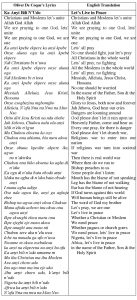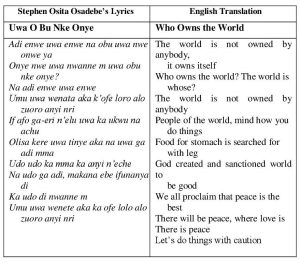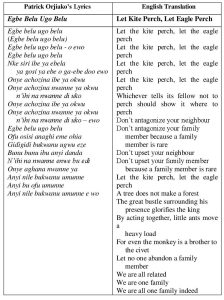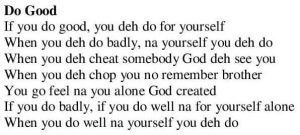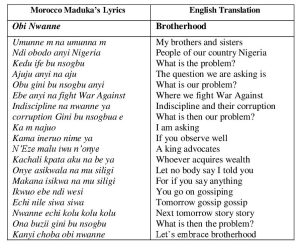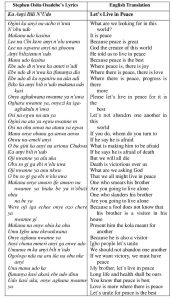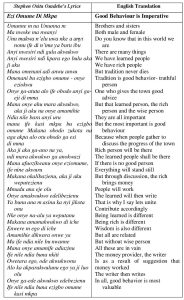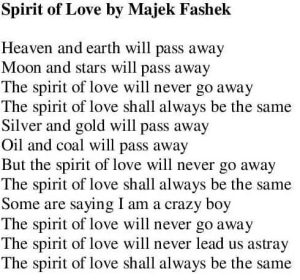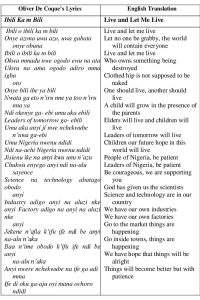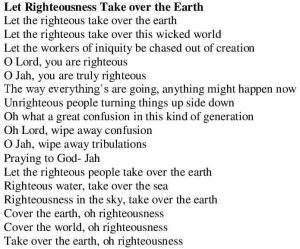
International Journal of General Studies (IJGS), Vol. 2, No. 2, July-September 2022, pp. 153-171 https://klamidas.com/ijgs-v2n2-2022-10/ |
||
|
Strategizing Works of Selected Nigerian Musicians for the Actualization of Global Peace in the 21st Century By Stella N. Nwobu*
Abstract Global volatility, conflicts, crisis, divergence, resentment, antagonism, misdemeanor, terrorism, war and other negative social trends proliferate as a result of ethnic, religious, political tensions and mostly human behavior. Many attempts made by various countries of the world and many world organizations to decrease, reduce and defuse these negative social trends acquiesced with little or no positive result because what is required is to work on human mind to achieve peace. The defenses of peace must be constructed in the minds of men, since wars normally begin in the minds of men. The aim of this paper therefore is to do collection of works of selected Nigerian musicians’ geared towards actualizing global peace in this 21st Century. Selected relevant texts from the works of Chief Osita Osadebe , Chief Dr. Oliver De Coque, Majek Fashek, Ojiakor Patrick among others were interpreted and analyzed under five categories: Admonition, Appeal, Advice, Impression and Revelation. Information was elicited by collection of some of their relevant records, through internet sources and review of some related literature. It revealed music as a tool through which awareness is created, “metanoia” achieved, with power to inspire and generate peace. These musicians through their music with inspiring lyrics are building peace, stopping violence, saving lives, and healing shattered communities. Strategizing their works entails collecting, notating, annotating their works, packaging them and putting them on the internet, television, radio, CD and use them as ringing tunes for the propagation in addition to life performances. It suggested that more encouragement should be given to these musicians for them to focus on promoting individual inner peace, love, compassion and forgiveness. This paper would open people’s minds and souls to follow the right parts, to embrace peace through right music which when evaluated, will be music that has immense worth for our societies and universal. Keywords: strategizing, musicians, actualization, global, peace
Introduction Peace is the process of progress and prosperity. It is the key ingredient to happiness. It is not merely the absence of war and hatred but also the presence of cooperation, compassion and worldwide justice. It is an interest to avoid conflict, tension, frustration, violence and war. Peace is vastly greater concept than lack of war, violence, poverty and inner turmoil. Peace is the combination of bodily peace, family peace, local peace, natural peace, inner peace and world peace. (World Peace Newsletter FaceBook community, 2011). Peace like reading or writing are learned skills that improve our knowledge, maturity, health, happiness and longevity. It is the most important lesson we should learn during our lives. Through knowledge, peace will evolve. Knowledge is power and knowledge combined with enlightenment leads to wisdom and wisdom is peace. The heart desire of Jesus Christ is that the world should be a peaceful one- full of peacemakers hence his greetings “Peace be with you”, “Peace I leave with you, my peace I give you” (John 14:27). In Mattew 5;5, He told us that blessed are the peace makers for they shall be called the children of God. Jesus Christ revealed the importance of peace to the world. We all want peace, we desire for peace and happiness. The basic human feelings are at the roots of achieving real, lasting world peace. To achieve this, individual responsibility is important. An atmosphere of peace must be created first within ourselves, then gradually expand to include our families, our communities and ultimately the whole planet. There are many ways to promote peace in this world but the best way is to promote it within ourselves. We can achieve peace on earth first and utmost, by finding it within ourselves. By sharing our inner peace with others, peace will spread. The most important key to peace is inner peace because of true love for both self and world, faith, meditation, self -esteem, compassion, hope, kindness, gratitude and wisdom which will make peace to spread to those around us. Through inner peace, genuine world peace can be achieved. Inner peace (or peace of mind) refers to the state of being mentally and spiritually at peace, with enough knowledge and understanding to keep oneself strong in the face of discord or stress. Peace of mind, serenity and calmness are descriptions of a disposition free from the effects of stress. In some cultures, inner peace is considered a state of consciousness or enlightenment that may be cultivated by various forms of training such as prayer, meditation, singing etc. World Peace Newsletter Face Book Community in October 2011 said: World peace is achieved by combining all the peace together to create hot peace – which is the absolute presence of worldwide justice, freedom, cooperation, negotiation,(working with both friends and enemies), education, mutual respect, sharing, compassion, kindness, happiness, joy, equanimity, human dignity and harmony with nature, animals and mother earth. Peace needs to surround us in the form of local safety and security which is best achieved through communication and negotiation with neighbors to attain mutual trust and respect for one another. Through love, world peace not only becomes possible, peace becomes probable. Functions of Music and Musicians in the Creation of Peace Music is the language of the soul, an indispensable companion in all circumstances. Music is indispensable in time of war, hardship, in time of sorrow, in time of frustration among others. Music has many functions. It is the social, emotional and cognition vehicle of society, reflecting the imprint of our present identity and the always – evolving identity. Nwobu (2015a) averts that: Music is certainly a true companion of humans as it works quite efficiently in mirroring behaviors, needs, and emotions. Music has been an efficient carrier of information that has been used for centuries as a vehicle to communicate and teach; because it effectively taps into memory (p. 9). Music is very useful to the society. It guides the society, reflects the society, records the society and watchdogs the society. Nwobu (2015a) noted that “music has immense worth. People learn many important and necessary values for life as it enhances their mind, their expressive ability and a host of other qualities” (p. 2). Music plays lots of role in the life of people. It plays a great role in keeping up the spirits of human being. Music since the 18th Century has been viewed as an ally of human solidarities and reconciliation and an instrument of peace. Music can arouse the same feeling in one person as in another- a feeling which is not however expressed by the same words. Music could bind and heal where words and images could not. As the truly universal means of communication, music became logical enemy of conflict and war and the natural instrument of peace. Emotionally, music portrays methods of shaping personality and / or patterning moral concepts. In the social sphere, music attempt to socialize the listeners by transmitting worthwhile roles in particular, emphasizing interpersonal relationship for the good of mankind. According to Nwobu (2015b), music is very useful in preventing conflict, promoting conflict resolution and sustaining peace (p. 207). Music works on the mind of people, in inner places of the soul, making a very powerful effect on them. Peace and understanding among nations are projected through music whose context is properly structured. Music is a unifying agent that promotes peace, harmony and co-operation among societies. It is a vehicle that promotes peace and builds awareness of the necessity of peace and avoids future conflict. With the flow of music that pours freely from the heart, people are united. Music with its power promotes respect and tolerance among people and community. It creates a peaceful global society. Music creates mutual understanding and respect when used in areas of severe ethnic tensions. It creates moments of inspiration and interconnection that can deeply affect the listeners and performers. Music saves lives when listened to and its power inspires compassion and faster understanding between cultures while deepening the bond that form our communities. With music, people can think about peace, talk about peace and promote peace. Music making and music performance offer critical spaces of human interaction as nonviolent means to pursue peace in profound ways. Songs are more powerful than bombs. “One good song with a message can bring a point more deeply to more people than a thousand rallies” says Phil Ochs. The power of music is the power of the heart. Music is the voice of the human spirit. It can go beyond language, beyond age or race or gender or nationality, beyond religious or political differences. Music is universal. Every culture on earth uses music, even the most isolated tribe. Music has been in use for thousands of years preceding the written and spoken word. On the other hand, music is connected with musicians. Without musicians, there is no way to pressure music and to have music performed and heard by people. Nwobu (2015a) noted that: Musicians especially musicologists devote most of their time creating music, making use of the best of their talents, the best of their techniques, the best of their imagination, the best of their experience to make music. They create and perform music that enhanced and manifest emotion, used as a carrier of information, stimulate the minds of a society and energize their spirit. A musician is a relevant and necessary institution in the society who uses the medium in which he is proficient to express the societal values in a language the people understand and appreciate (p. 9). Musicians are very useful members of the society that contribute to the functioning of the societal activities. Any person that is involved with music making whether as a composer, a performer, dancer, instrumentalist etc, is considered as a musician. Ibekwe (2010) noted that “musicians are great thinkers, or better described as philosophers who take cognizance of the events of the past, live up to the expectation of the present, and equip the mind for the future” (p. 33). Okafor (2005) identified three different categories of musicians and one of the categories is the musicians who perform music as their total profession. He described them as popular musicians whose music moves audiences and markets around the world. Musicians use the power of music to promote respect and tolerance among people and communities and to help create a peaceful, global society. In the areas where there are severe ethnic tensions, musicians use music in order to help create mutual understanding and respect. They believe that music has the power to inspire compassion and faster understanding between cultures while deepening the bond that form our communities. They believe in the power of music to create moments of inspiration and interconnection that can deeply affect both listeners and performers. Musicians initiate projects that bridge differences of culture, ethnicity, and ideology and help create a culture of peace. Musicians’ make global efforts to fill the world with music, as a call for peace and justice that will create a global celebration of peace and provides a voice for the vibrant community that believes in peaceful solutions for the future. Musicians create some songs with the intention to encourage people to think about peace, talk about peace and promote peace, cultural acceptance and understanding, for those who work towards peace throughout the world. Musicians through their music, direct, educate, mobilize, criticize and redirect the minds of people to move towards the right paths. Norman Vincent Peale says “change your thoughts and change your world”. A change in perception leads to a change in behavior which leads to a change in the world. Content Analysis of Songs on Peace by Nigerian Musicians Nigerian music has indeed played many roles in objectifying and unifying the philosophy and religious tenets of the Nigerian communities. Some Nigerian music presents a wealth of knowledge and stimulates learning experience among its audience. It is often well worded in proverbs, idioms, and metaphor so that audience is always given food for thought. The composer also makes use of parables to stimulate audience imagination in acquiring dedicative meaning from the performance communication. Agbese (as cited in Olesegun 2014:25) argues that “music has always been the most visible attempt employed by ourselves to listen to ourselves”. Music is a powerful medium of communication through which human actions and reactions are expressed. It provides a forum to mirror the society so that members could understand things better and learn more about life. Some of Nigerian music focuses on the teaching of morality and building restraints into the psyche of the public which leads to a change in perception and change in perception leads to a change in attitude which leads to a change in behavior and a change in behavior leads to a change in the world. Songs in Nigeria draw on kinds of themes related to the people’s way of life as records of their histories, belief and values which are easily seen in their texts. Okpala (2015) revealed that “song texts are powerful transformation tool that aids in shaping the life of man positively” (p. 204). Song text is an effective means of inculcating what is considered to be proper behavior into the lives of people. We shall consider the sample texts recorded in this paper and discuss the contents under the following: Admonition, Advice, Appeal, Revelation, and Impression. Admonition The term ‘admonition’ is used here to connote songs that give caution, caveat about the danger of war, about the danger of not being in peace. The texts of the selected musicians are seen as educative and created awareness on the danger of not being in peace and erroneous behavior. Examples of songs in this category include Ka Anyi Bili N’Udo a highlife song by Chef Dr. Oliver Sunday Akanike popularly referred to as Oliver De Coque from Ezinifite, Nnewi South Local Government Area, Anambra State. He was a Nigerian highlife musician and guitarist who recorded more than 73 albums to his credit. Below is the text of one of his songs titled Ka Anyi Bili N’Udo:
Oliver De Coque in this song above explicates as one of the core reasons for instability, crisis and conflicts in this world as “religious war”. He decided to address this issue, urging both Christians and Moslems to unite, to pray and not to fight. He warned everyone of the danger looming around which he believed that only prayer can prevent the danger of religious war which can easily turn into societal war. He advised that whether as a Christian, Moslem, Pagan or a Church goer0, all needed is peace, that all should live in peace. Another song on this situation is captured in the song titled Uwa Obu Nke Onye by Chief Stephen Osita Osadebe also known as the doctor of hypertension, an Igbo Nigerian highlife musician from Atani, Anambra State, Nigeria. He was a singer, song writer and record producer who was active between the year 1958-2007 with so many albums to his credit. In this track, Osadebe reminded us that no one owns this world, it is not mine neither is it yours. Therefore we should do things with caution; we should act accordingly for the interest of peace because peace is still the best. He sang:
Advice This category of texts gives a form of personal or institutional opinions, belief, system values, recommendations or guidance as it relates to peace. This is fully packaged in the song by Rev. Fr. Patrick Orjiako, a Catholic priest of the Arch Diocese of Onitsha and a teacher in All Hallow Seminary, Onitsha. In his song titled Egbe Belu Ugo Belu Fr. Patrick recommends to the public an advice generated form Igbo proverb, that both kite and eagle should be allowed to perch. He related the importance of unity, as brothers and sisters we need to unite because united we stand and divided we fall. Your brother or sister is rare to find and a tree does not make a forest. He advised that should be peace among all and we should avoid quarrel, and our actions should be peaceful.
Still in this situation, Osadebe in this track titled ‘Do Good’, advised that one who does well does it for oneself. He said when you do badly, you do it for yourself. If you cheat somebody, you are also cheating yourself. He told us that we are one and we should therefore act as one, live as one, eat as one, drink as one, talk as one so that there will be no division- meaning there is peace. He sang:
Another song in this category is captured in a track titled Obi Nwanne by Prince Morocco Maduka from Umugama Ukwulu in Dunukofia Local Government Area of Anambra State, Nigeria. His ideas and societal values of brotherhood was expressed in this song below:
Prince Morocco was calling on people of Nigeria to appreciate each other as people of the same blood, country and race and as people of worth. He calls people to excuse bitterness and seeks for people and brotherly love. Morocco through this song preaches to people to search for unity, love and progress of our Nation and State. Revelation This category of texts discloses facts, reveals the importance of peace in this present world. Hidden facts about peace are revealed through such texts. Examples of songs in this category include Ka Anyi Bili N’Udo a highlife song by Chef Stephen Osita Osadebe. He revealed to all that peace is the paramount thing in this world and we cannot look for better thing than peace, all that matters is peace. He revealed that it is God’s desire that the world he created should be in peace, and where peace is, there is joy, there is love, and there is progress. Everything is complete in this world of peace. If we want victory, we must have peace, long life shall be ours, and good health shall be ours. Therefore there is need that we unite so that we will live in this world of peace. He sang:
Chief Osita Osadebe in another song titled Ezi Omume Di Mkpa revealed to the audience the importance of having a judicious person, truthful and excellent person in the society and why good behavior is important. In a society where you have elites, aristocrats without truthful and well behaved persons who can give good suggestions for the Nation even on how to make use of the money and giving direction to the elites, everything will be unproductive. He sang:
Another song on this situation is captured in this track titled “The Spirit of Love” by Majekodunmi Fasheke, popularly known as Majek Fashek, a Nigerian reggae singer, song writer and guitarist. He is best known for the v1989 album- “Prisoner of Conscience” which included the single track “Let the Rightous Take Over the Earth”. Below are the song texts of this track:
Majek Fashek through this track revealed that only the spirit of love shall prevail. The heaven and earth, moon and stars, silver and gold, oil and coal shall all pass away but only the spirit of love shall never pass. He tried to change peoples’ perception towards things that are not important, that shall pass away- the change that will lead to change in attitude, change in behavior and a change in the world. Through love, world peace not only becomes possible, peace becomes probable. Impression This is another category of song texts with right inspiring lyrics, motivates ones feeling, ideas, opinion to accomplish one’s goal or just a reminder about appreciating the beauty of the world that we live in. Oliver De Coque in his song Ibili Ka m Bili gave the impression that the world will contain everybody. That there is no need to struggle, all shall live- the elders, the children, the leaders- all will live; he gave us the impression that the advent of science and technology to our Nation will turn things from good to best but it requires patience.
Appeal This category of song texts appeals to either God or human for help and support, an attempt to make God or someone do or accept something as right or proper by saying things that are directed at a person’s feeling; Majek Fashek in this situation had a song he titled ‘Let Righteousness Take Over The Earth’.
Majek Fashek through this song appeals to God-Jah to let the righteous people take over the earth, to let righteousness take over the earth. He prayed that righteous water should take over the sea and the righteousness in the sky should cover the earth. He prayed that the workers of iniquity be chased out of creation because, unrighteous people are turning things up side down , great confusion everywhere and he believe only Jah can wipe away such confusion and such tribulations. Strategizing Works of Selected Nigerian Musicians for the Actualization of Global Peace Man is not the ultimate measure of all things, rather he can only himself by reaching beyond himself. Hazrat Inayat Khan says “the solution to the problem of the day is the awakening of the consciousness of humanity to the divinity within”. Without proper spiritual idea, humanism would become phenomenon incapable of constructing adequate solutions to mans’ most essential problem and therefore incapable of helping man to attain his perfect fulfillment. Inner peace creates world peace. The power of music can be utilized to further the goal of peace on earth. There is no language required in the musical world for the power of music is the power of the heart. The global environment can survive only if we learn to live in peace and harmony with our fellow human beings. Some Nigerian musicians through their music focus on promoting individual inner peace, love, compassion and forgiveness. Their music showcases international, national, and ethnic with subjects ranging from the human condition to sustainability and the environment, with a mission to expand the definition of peace beyond anti-war ideology, activism or specific causes. Some Nigerian musicians’ help in actualization of global peace through voluntary service and love for the music profession, since most of them know the cultural, moral values which are imbedded in their music. It is therefore imperative to do a collection of their songs that relate to peace, notate and annotate them, package them and put them on the internet, television, radio, CD and use them as ringing tunes for many people to always hear them in addition to life performance. Music is a language of the soul. Musicians that have love for this profession should sacrifice their money, time to enhance the viability of the profession. They can use their music to educate the society by setting out messages they want to pass across to the society into music because words may not prevail, music does and that quite easier because it soars into the spirit. Considering the negative modern trends in Nigerian music, where some of the Nigerian musicians record and perform songs which show pointless/meaningless/corrupt lyrics, there is great need to split musicians just as we have different styles of such as highlife, pop, reggae, rock and others. They should be divided according to the issues they address such as “Peace musicians”; “Moral musicians”, “Sexual musicians”, “Theological musicians “and so on. They can also be divided into two: “Spiritual Texts Musicians and Social Texts Musicians”. All musicians that record and perform songs with sacred texts should belong to the spiritual group and all musicians with secular texts should belong to social group. This will serve as a point of direction to many musicians in choosing their contents properly. It will help to call to order, some of our musicians who are leading people astray through their music in the name of making money, whose music is full of pointless, meaningless/corrupt lyrics, who are not doing the proper work of a musician. As pointed by Ipere (2002:50), “the musician is by nature a moralist and great preacher”. These musicians offer nothing except corruption. Worthy texts musicians, through their music, direct, educate, mobilize, instigate, criticize and redirect the minds of people to move towards the right paths. They produce good music good melody, good instrumentation, meaningful lyrics, good sound, good tones; good vocal, written and sung by people who have experience what they are singing. Musicians through their music evangelize people, they met criteria for effective evangelization which are metanioa – radical change of heart and mind where the mind seeks the truth and the heart opened to life through love, conversion, be evangelized and be convinced. They are convinced and that is the essence of preaching to people to convince them too of the essence of peace in our society. Through their music, they disseminate information; they educate, criticize, mobilize, make social commentaries, direct and redirect the mind of people towards the rights paths. These selected works should be used for many things. TV/ Film producers should focus on acting themes related to peace and using such music in their film productions. NGOs and humanitarian organizations should engage the services of these musicians and their well structured songs contextually to project peace and understanding among nations. Global thought leaders, social enterprise and technology innovators through worldwide concerts can create transformational entertainment experience that empower, educate humanity by using these musicians for music promotion. Conclusion and Recommendations This paper has discussed the issues related to peace. Selected texts of Nigerian music that bother on peace has been analyzed and evaluated with a view of discovering what factors are responsible for the direction, interpreting the messages of the texts and to determine the significance of these songs in our troubled world. The song texts illuminated the different issues relating to peace and their needs in this era of instability and intolerance, and needs to promote better understanding through the power of music. “When the power of love overcomes the love of power, the world will know peace” said Jimi Hendrix. Music has the power to speak directly to the heart. It makes anger to melt, hatred dissolves and peace dawns. It can inspire enlightened awareness and lovingly empower us to see and treat each other as brother and sister. When our souls know such liberation, we then know it will end and peace on earth will prevail. The global environment can survive only if we learn to live in peace and harmony with our fellow human beings. We need the inspiration of music to help fulfill the dream of world peace. Music encourages us to transcend our petty differences. Music lifts us beyond ourselves and brings us together in awe, reverence and delight. It is medicine for the body and soul. Music has the ability to communicate deeply and bring people together. “Singing together helps us experience in the body our connection to each other and the planet, summons our collective courage, enlivens us and inspires us to play our part in creating a life sustaining society” says Gretched Sleicher. Some of the Nigerian musicians’ who help in actualization of global peace through their music should be encouraged to create more songs of peace and social change. The idea to showcase songs that inspire peace is to encourage the musicians who use their creativity to inspire positive change. The internet should be powerful tool through which songs that inspire peace around the world and beyond can be spread. We hope that by spreading the vibration of peace music, we can help to heal the world from war and destruction and separation. References Adedeji, F. (2011). Singing as an outcry for socio-economic emancipation and transformation in Africa: A textual analysis of selected Nigerian gospel songs. Obodom Journal of Music and Aesthetics. 1 (2). 47-57. Akwa Ibom: University of Uyo. Clingendael, (2013). UNESCO and the Culture of Peace. Retrieved from https://www.clingendael .nl/sites/default/files/UNESCO-and-the-culture–of-peace.pd Efurhievwe, M. (2010). Textual interpretation of indigenous communicative music used in trade advertisement. Awka Journal of Research in Music and the Arts (7). Pp. 22-31. Awka: Department of Music Nnamdi Azikiwe University Forchu, I. (2012). Nigerian hip hopp music: An analytical description of its forms. Journal of the Association of Nigerian Musicologists (6). Pp. 74-87. Nigeria: Association of Nigerian Musicologists Ibekwe, E.U. (2010). Musicians and the Philosophical Dimension of African Man. Awka Journal of Research in Music and the Arts (AJRMA) 7, 33-45. Ipere, D. Facts and Illusions. pp. 46-53. Ibadan: Stirling-Horden. Nwobu, S. N. (2015a). The leadership role of a musicologist in the 21st century Africa. African research Review: An International Multi–disciplinary Journal, bahir Dar, Ethiopia. 9(2) 2002). Music and Musicians in the Broardcasting Industry. In E. Idolor (ed). Music in Africa No.37 (Pp. 1-12). Nwobu, S. N. (2015b). A 21st century reformation: Music as an agent of global reconciliation. Ansu Journal of Arts and Humanities. 2(2). Pp. 205-213. Igbariam: Faculty of Arts Anambra State University Nzewi, M.. (1991). Musical Practice and Creativity: An African Traditional Perspective. Germany: Iwalewa-Haus, University of Bayreuth Ogidan, P. D. (2012). Music as Political Activism: A case Study of Fela Anikulapo Kuti’s Afro Beat. (A project submitted to the department of political science, faculty of social science, university of Lagos, in partial fulfillment of the requirement for the award of B.Sc: Political Science department). Okafor, R. C. (2005). Music in Nigerian Society. Enugu: New Generation Books Okafor and Okafor (2009). Music and National Development in Nigeria. Enugu: New Generation Books. Okpala, H. N. (2015). Song texts- a tool for global reconciliation: A study of selected Igbo songs. Ansu Journal of Arts and Humanities. 2(2). Pp. 199-204. Igbariam: Faculty of Arts Anambra State University. Olesegun, T. (2014). Textual analysis of selected songs that address issues of food security awareness in Nigeria. Nigerian Music Review (13). Pp. 24 – 36. Ile-Ife: Obafemi Awolowo University. Onyeji C. (2002). Popular Music: Facts About the Music and Musicians . In E. Idolor (ed.,. Music in Africa. Facts and Illusions ( pp. 24 -37). Ibadan: Stirling-Horden. Ubani, A. (2004). The compositional techniques of Igbo minstrel singers in Anambra State: An analytical study. Awka Journal of Research in Music and the Arts Pp. 114-126. Awka: Department of Music, Nnamdi Azikiwe University. Oziegbe, M. (2015). Nigerian biograghy. Retrieved from http://www.authorityngr.com Theresa Joseph (n.d). Global peace movement: Peace initiatives. Retrieved from http://www. theresajoseph.com/peaceinitiatives.php World Peace Newsletter Face Book Community (2011). Peace definition. Retrieved from http://www. world peacenews letter. com
*About the Author: Dr Stella N. Nwobu (sn.nwobu@coou.edu.ng) is of the Department of Music, Chukwuemeka Odumegwu Ojukwu University, Igbariam, Anambra State, Nigeria. |
||
